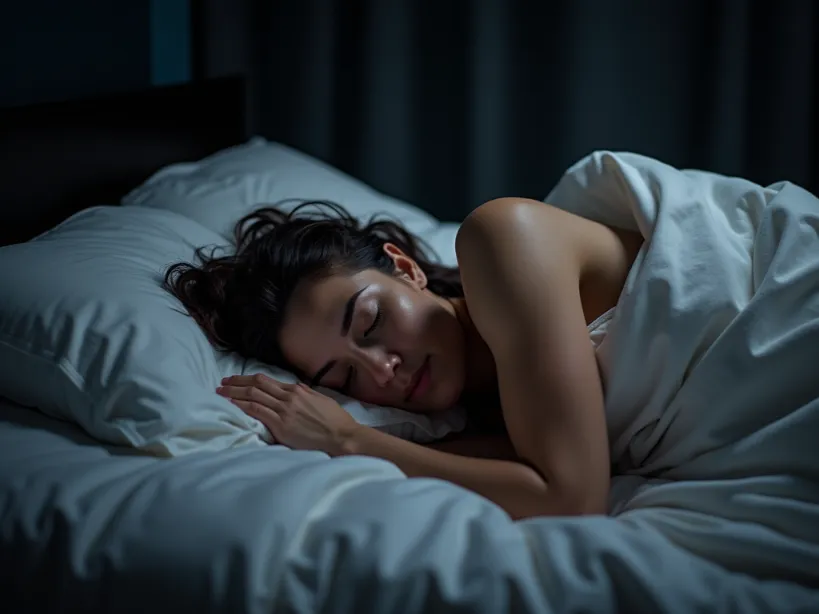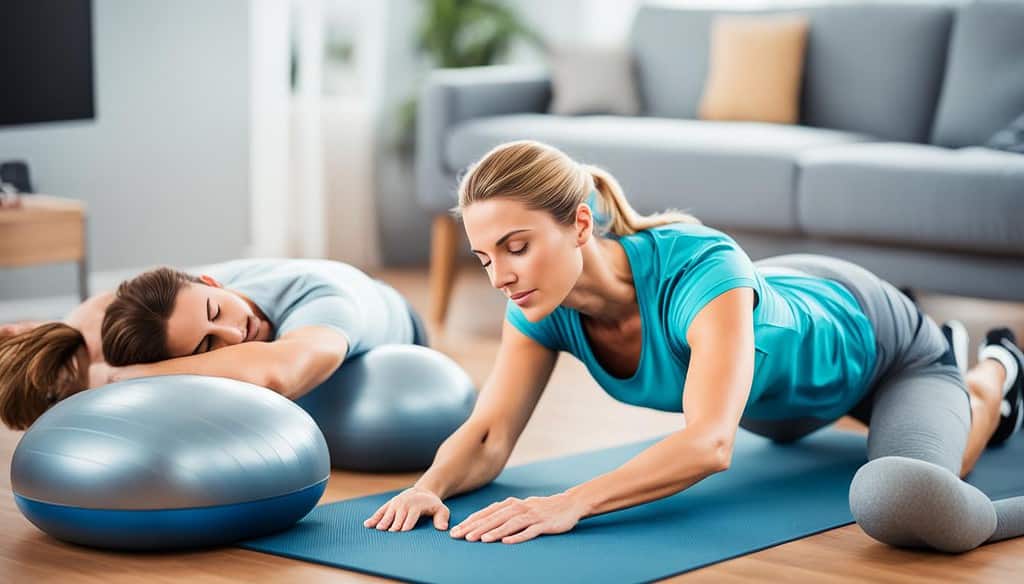Key Takeaways:
- Sleep is crucial for health (like diet & exercise!)
- Lack of sleep hurts performance & overall health
- Prioritize sleep for repair & brainpower
- Good sleep starts with diet (calcium, magnesium, vitamins) & exercise (any kind!)
- Tips: consistent sleep schedule, comfy bed, no screens before bed, relax, and avoid late-night meals
The Interconnection Between Diet, Exercise, and Sleep
Diet, exercise, and sleep are deeply interconnected. They form the essential triad for optimal health and peak performance. A balanced diet fuels the body, aids muscle recovery, and supports overall health. Exercise strengthens muscles, maintains a healthy weight, and directly improves sleep quality. Quality sleep enables critical recovery, aids tissue repair, and regulates key hormones like cortisol and growth hormone.
| Component | Function | Impact |
|---|---|---|
| Diet | Fuels the body and aids recovery | Supports overall health |
| Exercise | Strengthens muscles and maintains weight | Improves sleep quality |
| Sleep | Allows recovery and tissue repair | Regulates hormones |
Neglecting one pillar sabotages the others. Poor nutrition cuts workout performance by 31%. Inadequate sleep increases junk food cravings by 45%. This creates a destructive cycle.
Next, we’ll discuss how diet impacts health and sleep. We’ll focus on nutrients that promote better sleep quality.
The Impact of Diet on Health and Sleep
A balanced diet directly promotes overall health and restful sleep. The foods we eat profoundly affect sleep quality. Mindful nutritional choices, rich in essential nutrients, are key to optimizing sleep and well-being.
The Powerful Connection Between Diet and Sleep Quality
Prioritize all three. Your fitness results will improve by 200%.
A balanced diet promotes overall health and restful sleep. Certain nutrients can significantly affect sleep quality.
| Nutrient | Function | Food Sources |
|---|---|---|
| Calcium | Aids melatonin production | Dairy, leafy greens, fortified plant milk |
| Magnesium | Promotes relaxation | Nuts, seeds, whole grains, leafy greens |
| Vitamins A, C, D, E | Support health and sleep regulation | Fruits, vegetables, fortified foods |
Incorporating these nutrients into your diet can improve sleep quality and support a healthy sleep routine.
Foods That Can Disrupt Sleep
Some foods enhance sleep, while others disrupt it. Key dietary components include:
| Food Type | Effect |
|---|---|
| Caffeine | Interferes with sleep, limit intake especially later in day |
| High-calorie foods | Heavy, spicy, high-fat meals before bedtime can disrupt sleep |
Healthy food choices promote restful sleep and overall well-being. A balanced, nutrient-rich diet free of disruptors improves sleep quality.
Practical Tips for Promoting Better Sleep through Diet
- Here are some practical tips to incorporate into your lifestyle for promoting better sleep through diet:
- Plan your meals: Opt for a balanced diet that includes a variety of nutrient-rich foods.
- Avoid large meals before bed. Keep dinner light and allow enough time for digestion before sleep.
- Limit caffeine and alcohol: Reduce or eliminate caffeine and alcohol intake, especially close to bedtime.
- Stay hydrated: Drink enough water throughout the day, but avoid excessive fluid intake before bed to prevent nighttime disruptions.
By prioritizing a balanced diet and making conscious choices, we can support our overall health. This also helps optimize sleep quality.
Recommended Food Groups for Better Sleep
| Food Group | Examples |
|---|---|
| Fruits | Apples, berries, citrus fruits |
| Vegetables | Leafy greens, broccoli, carrots |
| Whole Grains | Oats, quinoa, brown rice |
| Lean Protein | Chicken, turkey, fish, tofu |
| Dairy/Alternatives | Milk, yogurt, cheese, fortified plant-based milk |
| Nuts and Seeds | Almonds, walnuts, chia seeds |
Including a variety of these foods in your diet can help promote better sleep and overall health.
The Powerful Influence of Exercise on Health and Sleep

Exercise is essential for health and better sleep. Regular physical activity boosts sleep duration and quality, whether it’s aerobic exercise, resistance training, or simple movement.
Exercise reduces chronic disease risk, enhances cardiovascular health, and strengthens muscles and bones. It improves circulation and regulates the sleep-wake cycle, promoting better sleep.
Timing is important; avoid vigorous workouts close to bedtime to prevent sleep disruption.
Mentally, exercise reduces anxiety and depression, enhances cognitive function, and improves mood and self-esteem. Regular exercise leads to better sleep and overall health.
Stay active for holistic physical and mental health benefits.
| Benefit | Description |
|---|---|
| Disease Prevention | Reduces risk of chronic diseases |
| Cardiovascular Health | Enhances heart and circulatory system |
| Musculoskeletal Strength | Strengthens muscles and bones |
| Sleep Regulation | Improves sleep-wake cycle |
| Mental Health | Reduces anxiety and depression, enhances cognitive function |
Note: Avoid vigorous workouts close to bedtime to prevent sleep disruption.
Practical Tips for Improving Sleep Hygiene in 2026
| Tip | Description |
|---|---|
| Consistent Schedule | Go to bed and wake up at the same time daily |
| Comfortable Environment | Keep bedroom cool, dark, and quiet with comfortable bedding |
| Limit Screen Time | Avoid blue light devices at least an hour before bed |
| Relaxation Techniques | Practice reading, warm baths, or deep breathing exercises |
| Avoid Large Meals | Choose light snacks instead of heavy meals close to bedtime |
The Proven Benefits of Side-Sleeping

Side-sleeping, especially on the left side, offers several health benefits:
| Benefit | Description |
|---|---|
| Reduced Sleep Apnea Risk | Keeps airway open, prevents throat muscle collapse |
| Improved Digestion | Uses gravity to move food naturally, reduces acid reflux |
| Better Brain Health | Enhances brain waste clearance through glymphatic system |
| Reduced Snoring | Keeps airways open, leading to quieter sleep |
Note: Side-sleeping may cause shoulder numbness or hip/back pain. Tools like the Rematee.com Bumper Belt can provide support and comfort.
The Rise of Functional Strength Training in Modern Fitness
Strength training offers numerous benefits for physical and mental well-being:
| Benefit | Description |
|---|---|
| Muscle Mass | Increases and maintains muscle, crucial as we age |
| Bone Health | Enhances bone density and joint stability |
| Flexibility | Improves overall flexibility and reduces muscle imbalances |
| Cognitive Function | Enhances brain health, memory, and cognitive abilities |
| Disease Prevention | Reduces risk of chronic conditions like cancer and diabetes |
| Mental Health | Reduces anxiety, depression, and stress hormones |
Example Functional Strength Training Workout
| Exercise | Sets | Reps |
|---|---|---|
| Squats | 3-4 | 8-12 |
| Deadlifts | 3-4 | 8-12 |
| Bench Press | 3-4 | 8-12 |
| Rows | 3-4 | 8-12 |
| Overhead Press | 3-4 | 8-12 |
Aim for 2-3 sessions per week for optimal results.
The Demand for Data-backed Health Products

Consumers increasingly seek health products with scientific backing.
| Feature | Importance |
|---|---|
| Scientific Proof | Rigorously tested and proven effective |
| Transparency | Clear information on ingredients and efficacy |
| Professional Recommendations | Valued input from healthcare professionals |
| Regulatory Approval | Recognition from authorities like FDA |
The Trend of Temperature Therapies
Temperature therapies are gaining popularity for recovery and inflammation reduction.
| Therapy Type | Benefits |
|---|---|
| Hot (Saunas, Hot Baths) | Muscle relaxation, improved circulation, and detoxification |
| Cold (Cryotherapy) | Reduced inflammation and pain alleviation |
These therapies may improve recovery, performance, sleep quality, mood, and stress relief.
Conclusion
Sleep is crucial for fitness and health. To achieve optimal health, prioritize good sleep hygiene along with a balanced diet. Add regular exercise, too. Understanding the links between sleep, diet, and exercise enhances your fitness journey.
Using sleep tracking tools can help individuals understand their sleep patterns, duration, and quality, enabling them to make informed changes to their routines. By using the strategies in this article, readers can improve their sleep quality, enhance fitness results, and lead healthier lives.
Prioritize sleep for improved performance. It helps with faster recovery and overall well-being.
FAQ
What is the role of sleep in fitness and health?
Sleep is crucial for well-being, akin to nutrition and exercise. During sleep, our bodies perform cellular repair and cognitive consolidation, vital for physical and mental health.
How are diet, exercise, and sleep interconnected?
A balanced diet delivers essential nutrients, exercise keeps the body fit, and sleep ensures recovery. Neglecting any pillar affects the others, leading to poor health. Prioritizing all three is crucial for optimal fitness and health.
What is the impact of diet on health and sleep?
A nutritious diet lowers the risk of heart disease and diabetes and improves sleep. Essential nutrients like calcium, magnesium, and vitamins A, C, D, and E can enhance sleep quality.
How does exercise influence health and sleep?
Regular exercise reduces chronic disease risk, improves cardiovascular health, strengthens muscles and bones, and maintains healthy sleep. Activities like aerobic exercises, resistance training, and regular movement can enhance sleep quality.
What are some practical tips for improving sleep hygiene?
Maintaining a consistent sleep schedule, creating a comfortable environment, limiting screen time, practicing relaxation, and avoiding large meals before bed can greatly improve sleep quality.
What are the benefits of side-sleeping?
Side-sleeping, particularly on the left, can lower sleep apnea risk, enhance digestion, reduce heartburn and reflux, boost brain health, and lessen snoring. However, it may cause shoulder or arm numbness, hip or back pain, and facial wrinkles.
Why is strength training gaining popularity in fitness?
Strength training provides many benefits: increased longevity, mobility, flexibility, cognitive function, disease prevention (cancer, diabetes), and improved mental health, reducing anxiety and depression.
What is the demand for data-backed health products?
Consumers are becoming more selective, seeking rigorously tested, scientifically proven products with transparent ingredients and efficacy, plus recommendations from healthcare professionals and trusted sources like the FDA.
What is the trend in temperature therapies?
Temperature therapies such as cryotherapy, cold plunges, and saunas are popular for aiding recovery and reducing inflammation. Hot treatments improve circulation and relax muscles; cold treatments reduce inflammation and aid muscle recovery.
What is the role of sleep in fitness and health?
Sleep, essential for fitness and health, is often overlooked. Understanding the links between sleep, diet, and exercise, applying practical sleep tips, and embracing emerging trends can help individuals maximize sleep’s benefits in their fitness journey.
References
https://www.linkedin.com/pulse/unlocking-triad-health-sleep-nutrition-exercise-rematee-inc
